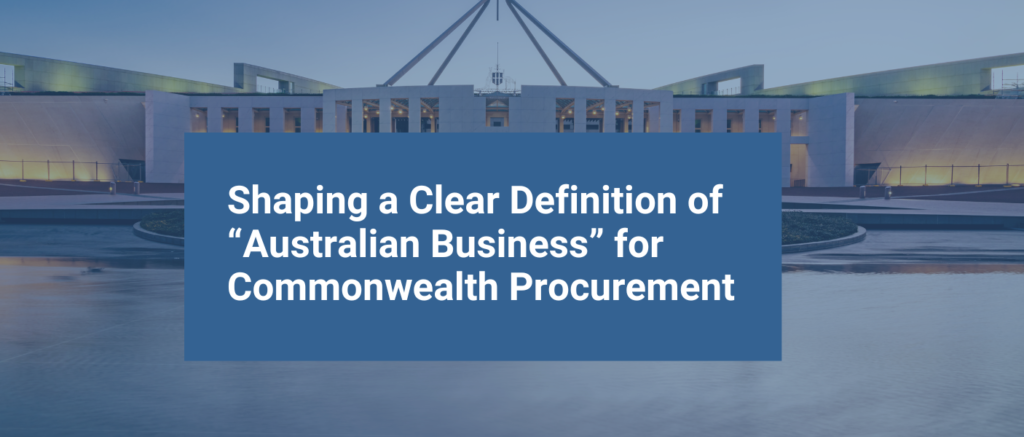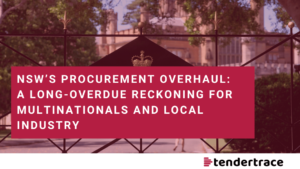As a company dedicated to empowering Australian businesses in the government procurement landscape, Tendertrace jumped at the chance to contribute to the recent public consultation on defining what constitutes an “Australian business” for Commonwealth procurement. This definition will set the groundwork for more inclusive and transparent procurement practices, benefiting both government agencies and suppliers, including SMEs and First Nations enterprises.
Our submission drew on our extensive experience in the sector, with the goal of ensuring that the new definition fosters local business growth, aligns with Australia’s broader policy objectives, and encourages ethical and sustainable supplier engagement. Below are some of the key areas we addressed in our submission:
Key Elements of an Australian Business Definition
We proposed a multi-faceted approach to defining Australian businesses, considering factors such as local operational presence, tax residency, and control. These criteria would help ensure that businesses benefiting from government contracts are genuinely contributing to the Australian economy. Our recommendation included a tiered structure for business sizes (small, medium, large) based on employee count and turnover, aligning with ABS standards.
Prioritising First Nations Businesses
Tendertrace strongly supports the continued prioritisation of First Nations businesses under the Indigenous Procurement Policy (IPP). We proposed mechanisms to encourage the inclusion of certified First Nations enterprises, providing them with specific recognition in the procurement process. This is vital for promoting reconciliation and economic empowerment, aligning with the government’s broader objectives.
Transparent Reporting for Greater Accessibility
We highlighted the importance of making contract reporting more accessible, especially for SMEs and First Nations businesses. By suggesting enhancements to reporting practices on platforms like AusTender, we aim to boost transparency and make it easier for procurement officers to identify diverse suppliers. This, in turn, enhances visibility for small and emerging businesses.
Streamlining Procurement Panel Selection for SMEs
One challenge facing smaller suppliers is the complex and resource-intensive process of being selected for government procurement panels. We recommended that the government simplify and streamline this process, lowering administrative barriers and ensuring that SMEs and First Nations businesses have a fair chance to compete.
Flexibility and Scalability in the Definition
We advocated for a flexible, tiered definition that accommodates various business sizes and types. A rigid, one-size-fits-all approach could disadvantage SMEs or newer businesses that are still scaling. Our tiered approach supports a diverse range of suppliers, fostering competition and encouraging innovation within Australia.
Alignment with Broader Government Goals
Our submission emphasised the need for the business definition to align with broader policy objectives, including:
SME Participation: Supporting small and medium-sized enterprises in accessing government contracts.
Local Industry Development: Encouraging suppliers that contribute to local employment, especially in regional areas.
Environmental and Social Outcomes: Promoting businesses with sustainable practices that also contribute to social objectives, such as job creation for underrepresented groups.
International Trade Compliance
Finally, we noted that any new definition must respect Australia’s international trade obligations, including WTO agreements and Free Trade Agreements (FTAs). By balancing local prioritisation with compliance, we can promote Australian businesses without compromising our global commitments.
Conclusion:
Through our submission, we aimed to highlight the value of an inclusive and adaptable procurement framework that recognises the contributions of all Australian-based businesses. We believe that a well-defined approach will not only support local industry but also foster a procurement environment where transparency, equity, and economic empowerment are prioritised.
Our recommendations focus on creating fairer opportunities for businesses of all sizes, backgrounds, and regions, and we’re hopeful that these ideas will contribute to a more inclusive, effective procurement landscape.
If you’re interested in seeing our full submission and detailed recommendations, we’d be happy to share it with you—just reach out.





